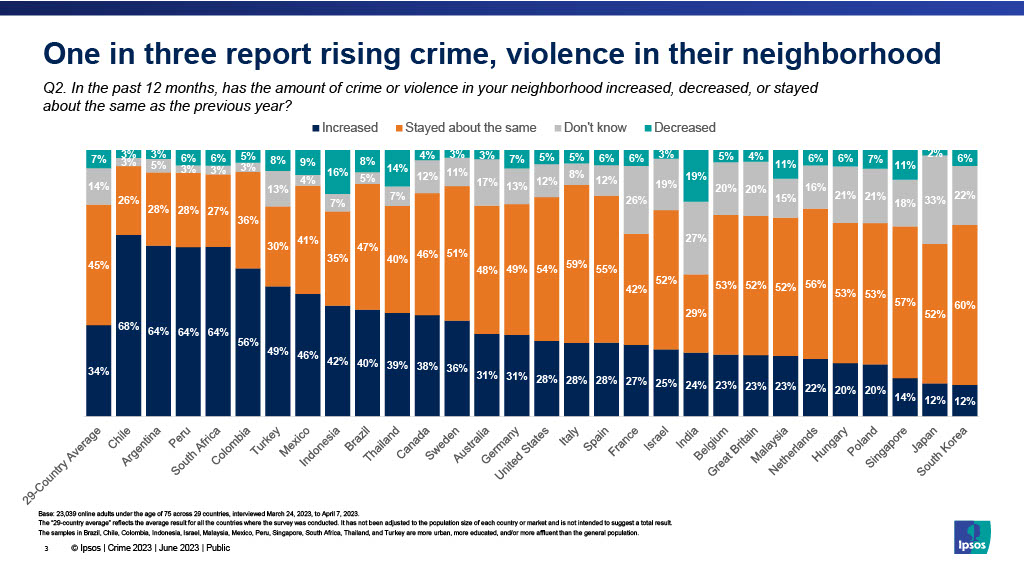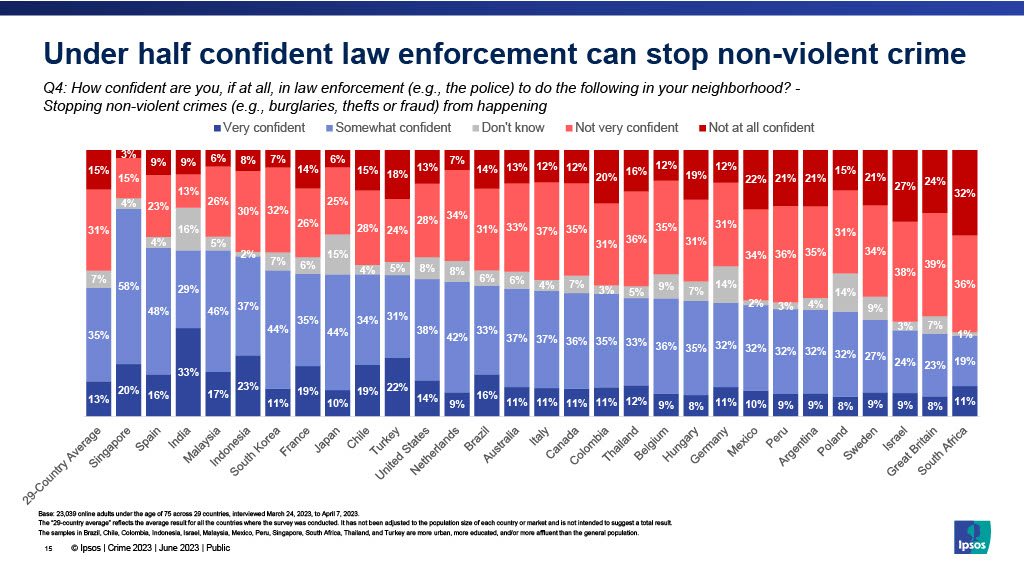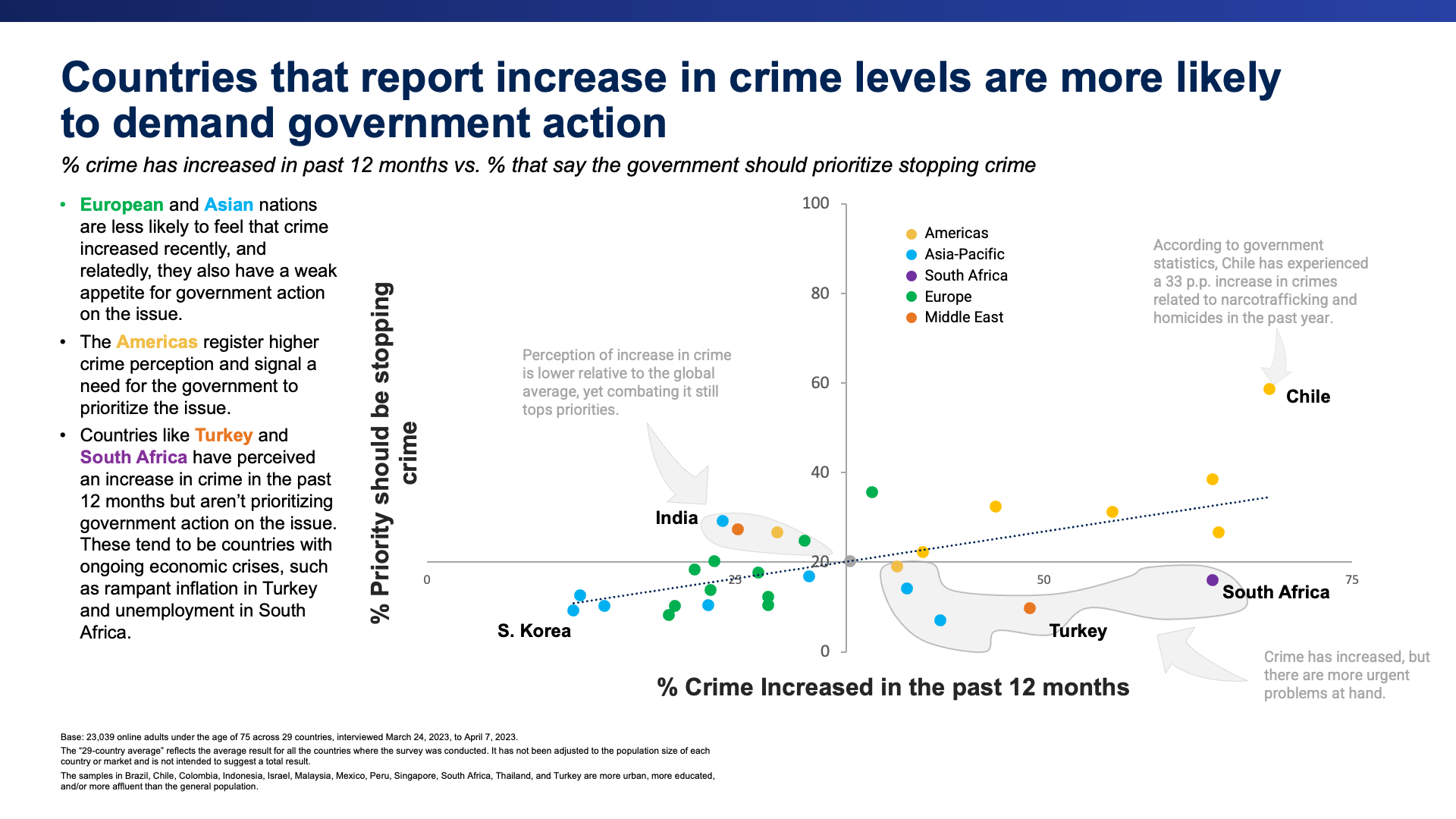Globally, Britons among the least confident in law enforcement’s ability to stop crime
The latest global Ipsos survey on perceptions of crime and law enforcement across 29 countries finds that confidence in law enforcement in Britain is among the lowest of all countries surveyed. The survey was conducted by Ipsos on its Global Advisor online platform from March 24 to April 7 2023 among more than 23,000 adults under the age of 75 including 1000 British adults. Among the findings:
- A quarter (23%) of Brits report that crime or violence in their neighbourhood has increased in the past year.
- However, Britons’ confidence in law enforcement to stop crime and arrest the correct perpetrators is amongst the lowest of all countries surveyed.
- Illegal drug consumption (54%), vandalism (49%), vehicle thefts (47%) and burglaries (47%) are the most reported crimes occurring in British neighbourhoods.
Perceived incidence of crimes
A quarter (23%) of Britons say that crime or violence in their neighbourhood has increased in the past year, while half (52%) say it’s stayed the same. Only 4% report that crime decreased in their area. This reflects perceptions globally – respondents in every country polled were more likely to report that crime was increasing rather than decreasing in their neighbourhood in the past 12 months.

In line with the average across the 29 countries polled, illegal drug consumption (54%), vandalism (49%), vehicle thefts (47%), and burglaries (47%) are the most reported crimes occurring in British neighbourhoods in the past year out of the 10 crimes polled.
However, perceived levels of violent crime are lower in Britain compared to other countries. Across the 29 countries polled, over a third report violence against women (40%), men (34%), or children (36%) occurring in their local neighbourhood in the past year. This is significantly less in Britain, where less than three in ten recall seeing or hearing about violence against women (27%), men (28%), or children (23%) in their neighbourhood.
Reported violence against women is most prevalent in South Africa (68%), Turkey (65%), and Peru (63%). Indonesia stands out among all 29 countries in terms of violence against minors, with 66% of people reporting violence against minors taking place in their communities. Violence against men is most reported in South Africa (55%), Brazil (55%), and Thailand (54%).
Countries with the highest levels of reported violence in their communities tend to be in South or Latin America, while countries with lower rates of perceived violence tend to be in Europe.
Confidence in law enforcement
Confidence in law enforcement to stop crime and arrest the right perpetrators in Britain is lower than the 29-country average across a range of metrics.
- Britons are least confident in law enforcement’s ability to stop non-violent crime. Britain ranks second to last among all 29 countries surveyed, with only one in three (31%) confident that law enforcement can stop non-violent crime. This is 17 percentage points below the 29-country average (48%).
- Briton’s confidence in law enforcement to stop violent crime places them in the bottom three of the 29 countries surveyed. Around two in five (37%) Briton’s are confident that law enforcement can stop violent crime, compared to half (50%) across all 29 countries.
- Two in five (39%) Britons are confident law enforcement can find and arrest the correct criminal after a crime. This is 14 percentage points below the 29-country average (53%).
- Less than half (48%) of Britons are confident that law enforcement will treat all citizens with the same level of respect, significantly less than the 29-country average (53%).

However, confidence in law enforcement varies by demographic in Britain. Younger people are more confident in law enforcement across a number of metrics. Over half of Gen Z say they are confident in the ability of law enforcement to stop violent (55%) and non-violent (52%) crimes, compared with just 21% and 15% of Baby Boomers respectively .
Conservative party supporters are also consistently more likely than Labour voters to report confidence in the ability of law enforcement. Three in five Conservative voters (61%) have confidence in law enforcement to treat all citizens with the same level of respect, compared with two in five (40%) Labour voters. Conservative voters also report more confidence in law enforcement to stop both violent (42% Conservative vs. 30% Labour), and non-violent (36% Conservative vs. 26% Labour) crimes from happening.
Most Britons would rather prioritise creating jobs, boosting the economy, than fighting crime
In line with respondents across most of the 29 countries, Britons would prefer the government to prioritise creating jobs and boosting the economy (55%) or protecting local citizens’ health and environment (31%) rather than stopping or reducing crime (14%).
Countries that report an increase in the levels of crime tend to be more likely to demand government action on stopping crime. Respondents in countries such as Turkey and South Africa have perceived an increase in crime in the past 12 months but aren’t prioritizing government action on the issue. These tend to be countries with ongoing economic crises, such as rampant inflation in Turkey and unemployment in South Africa.
European and Asian nations are less likely to feel that crime increased recently and have a weak appetite for government action on the issue. Meanwhile, the Americas register higher crime perception and signal a need for the government to prioritize the issue.

The full data can be found here
About the study
These are the results of a 29-country survey conducted by Ipsos on its Global Advisor online survey platform and, in India, on its IndiaBus platform, between Friday, March 24 and Friday, April 7, 2023. For this survey, Ipsos interviewed a total of 23,039 adults aged 18 years and older in India, 18-74 in Canada, Israel, Malaysia, South Africa, Turkey, and the United States, 20-74 in Thailand, 21-74 in Indonesia and Singapore, and 16-74 in all other countries.



